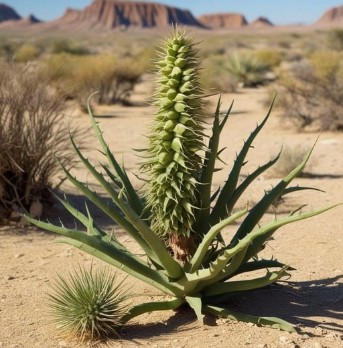Hoodia gordonii is a succulent plant native to the Kalahari Desert of southern Africa that has gained international attention for its traditional use as a hunger suppressant among indigenous San people. For generations, San hunters have reportedly consumed small portions of the plant during long hunting expeditions to reduce hunger and thirst in the harsh desert environment.
What is Hoodia Gordonii?
- Scientific name: Hoodia gordonii
- Common names: Bushman's Hat, Queen of the Namib, Xhoba
- Plant family: Apocynaceae
- Native region: Angola, Botswana, Namibia, South Africa
- Appearance: Spiny, cactus-like succulent with fleshy stems and flesh-colored flowers
- Conservation status: Protected under CITES (Convention on International Trade in Endangered Species)

Hoodia gordonii in its natural desert habitat
Research and Scientific Interest
Scientific interest in Hoodia gordonii began in the 1960s when researchers noted its use by San people. Subsequent research led to the identification of steroidal glycosides, particularly a compound called P57, which was initially believed to be responsible for the plant's appetite-suppressing effects.
Laboratory and Animal Studies
Early laboratory research showed promising results in animal models. One study found a dose-dependent reduction in food intake (12-26%) in rats given Hoodia extract, with appetite suppression persisting for 6 hours after administration. Research has suggested that the active compound P57 might work by influencing ATP (adenosine triphosphate) levels in the hypothalamus, potentially mimicking the effects of glucose and signaling fullness to the brain.
Human Clinical Research
Despite widespread commercial interest, human clinical research on Hoodia remains limited. In one of the few published clinical trials, researchers studied healthy overweight women who consumed Hoodia extract or a placebo for 15 days. In this study, participants taking Hoodia experienced more adverse effects than those taking placebos, including nausea, vomiting, dizziness, and unusual skin sensations. The researchers identified clinical and safety concerns related to blood pressure and heart measures.
Consumer goods company Unilever had invested significantly in developing Hoodia products but discontinued the project in 2008 after their research indicated safety and efficacy concerns. Pfizer similarly stopped development on P57, citing both difficulties in synthesizing the compound and indications of unwanted effects on the liver.
Important Considerations
Potential Side Effects
Studies and anecdotal reports have identified several potential adverse effects associated with Hoodia consumption:
- Nausea and vomiting
- Dizziness and headaches
- Unusual skin sensations
- Elevated heart rate
- Increased blood pressure
- Potential liver concerns
Quality and Authenticity Concerns
As a protected plant with limited supply, Hoodia gordonii products face significant challenges:
- Hoodia plants grow slowly and are protected under CITES
- Many commercial products may contain little or no actual Hoodia
- Products may be adulterated with other plant species
- No standardized testing methods for verifying authenticity
- Limited regulatory oversight in many countries
Medical Precautions
Certain individuals should exercise particular caution or avoid Hoodia:
- Pregnant or breastfeeding women
- People with heart conditions or high blood pressure
- Individuals with diabetes or taking medications for blood sugar
- Those with liver or kidney conditions
- Anyone taking medications that might interact with Hoodia
- Individuals with eating disorders
Ethical Considerations
The commercialization of Hoodia raises important ethical questions:
- Indigenous knowledge and intellectual property rights
- Benefit-sharing with San communities
- Conservation of an endangered plant species
- Sustainable harvesting practices
- Fair compensation for source communities
Interested in Quality Hoodia Products?
At Weight Loss Diets, we understand the importance of quality and authenticity when it comes to natural supplements. While research on Hoodia continues to evolve, we carefully source our products to ensure the highest possible quality.
For information about purchasing Hoodia products, including pricing, availability, and detailed product specifications, please contact our customer service team through our dedicated contact page.
Important: Before starting any supplement regimen, including Hoodia, consult with a healthcare professional, particularly if you have existing health conditions or are taking medications. The information provided on this page is for educational purposes only and is not intended to diagnose, treat, cure, or prevent any disease.
Other Approaches to Weight Management
While natural supplements like Hoodia may be of interest, it's important to remember that the most evidence-based approaches to weight management include:
- A balanced, nutritious diet focused on whole foods
- Regular physical activity appropriate for your fitness level
- Behavioral strategies for managing hunger and food choices
- Adequate sleep and stress management
- Medical supervision for significant weight loss needs
Explore our website for comprehensive information on proven weight management strategies:
